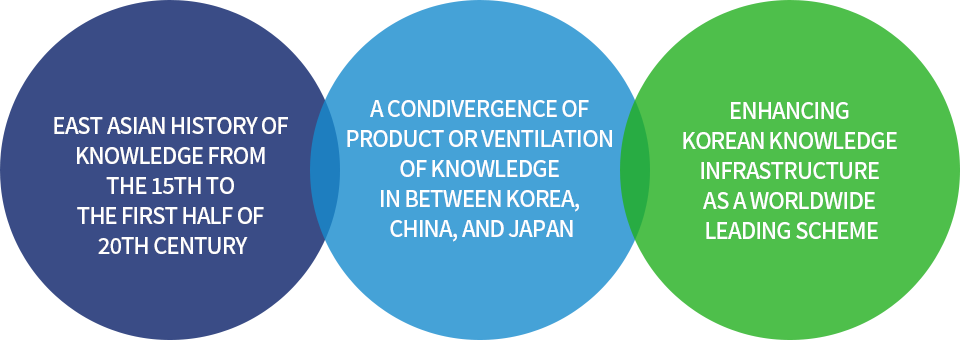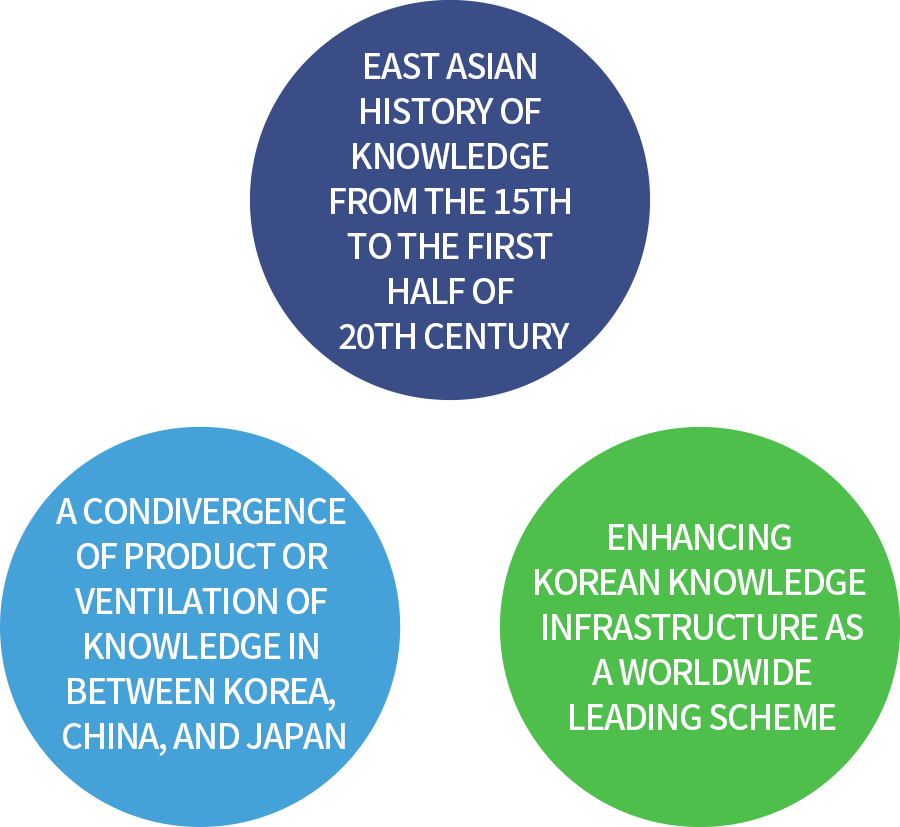Agenda
Agenda
The Transition of Knowledge power and East Asian Humanities
A Condivergence of System and Ventilation of
Knowledge in between Korea, China, and Japan


- investigating features of East Asian Knowledge system
- Reconstruction of East Asian geography
- Intertwined aspects of knowledge and society in East Asia
- Examination of commonality or difference of knowledge tradition in between Korea, China, and Japan
- Analysis of localizing aspects of Western knowledge in the modern age of East Asia
-
investigating features of East Asian Knowledge system
Here we attempt to classify intellectual groups by historical ages in Korea, China, and Japan, and examine intertwined aspects of those groups.
This research will show specific intelligence geography of each age and the ventilating aspects of knowledge in ordered mods, and, moreover, the diachronic aspects of segmentation, elimination, convergence, and so forth of both intellectual groups and knowledge, changed age by age of East Asia, from a synchronic perspective.
'School', 'faction', 'groups', 'institutes' are major research subjects, based on diverse data such as literature, letters, compilations, and so forth. -
Reconstruction of East Asian geography
Here we attempt to classify intellectual groups by historical ages in Korea, China, and Japan, and examine intertwined aspects of those groups.
This research will show specific intelligence geography of each age and the ventilating aspects of knowledge in ordered mods, and, moreover, the diachronic aspects of segmentation, elimination, convergence, and so forth of both intellectual groups and knowledge, changed age by age of East Asia, from a synchronic perspective.
'School', 'faction', 'groups', 'institutes' are major research subjects, based on diverse data such as literature, letters, compilations, and so forth. -
Intertwined aspects of knowledge and society in East Asia
The value and utility of knowledge is to be investigated on history of ventilation and contribution of knowledge to society.
Knowledge also has lead changes of society or been segmented or eliminated as well as intellectual groups.
Additionally we often discover a kind of knowledge or an intellectual group had come out to be emerged after some time.
Therefore, social atmosphere or obstacles should be examined because they affects development or circulation of knowledge as well as essential feature of a specific theory.
'Type', 'woodblock', 'institute', 'policy', and 'regulation' are major resources for this research. -
Examination of commonality or difference of knowledge tradition in between Korea, China, and Japan
We reject state-oriented perspective of history because that kind of notion can significantly disrupt cross-cultural studies.
At the same time, however, knowledge tradition differs from both social features and ages.
This had not only been affected by intellectual groups, but also by political parties.
For, the commonality and difference in between East Asian countries are significant data to comprehend both diachronic and synchronic knowledge geography.
Additionally, this provides that which factors of society affect to accommodating, maintaining, modifying, or rejecting knowledge.
'Publishment', 'diplomacy', 'figure', 'policy', 'system' are major resources for this research. -
Analysis of localizing aspects of Western knowledge in the modern age of East Asia
The value and utility of knowledge is to be investigated on history of ventilation and contribution of knowledge to society.
Knowledge also has lead changes of society or been segmented or eliminated as well as intellectual groups.
Additionally we often discover a kind of knowledge or an intellectual group had come out to be emerged after some time.
Therefore, social atmosphere or obstacles should be examined because they affects development or circulation of knowledge as well as essential feature of a specific theory.
'Type', 'woodblock', 'institute', 'policy', and 'regulation' are major resources for this research.
We are about to verify a trend of both creation and distribution of knowledge
power in this knowledge-based era throughout those five studies above, and lead Korean knowledge society finally into
the vanguard of knowledge creation and distribution not only in East Asian area but also out to the worldwide.




